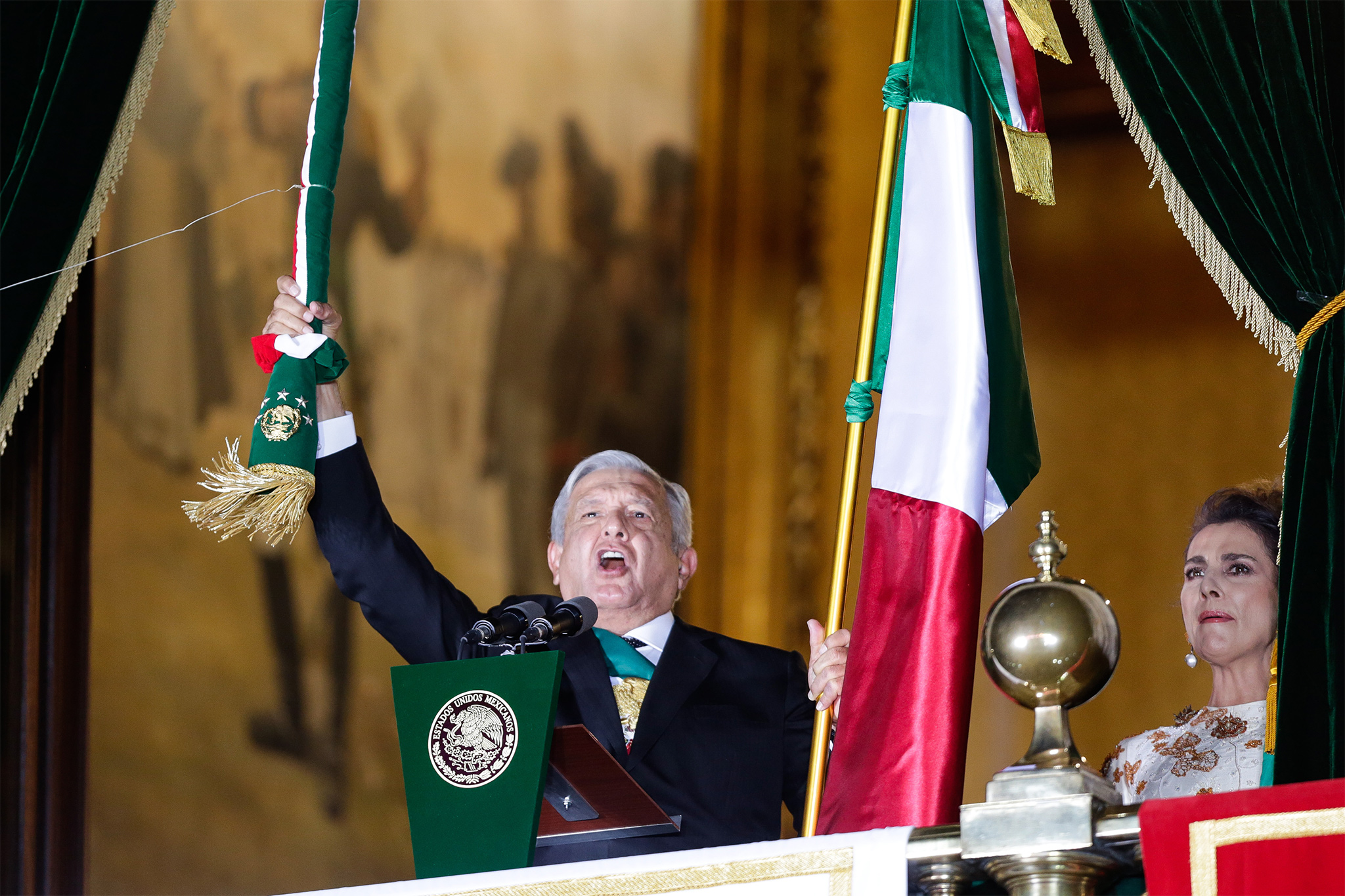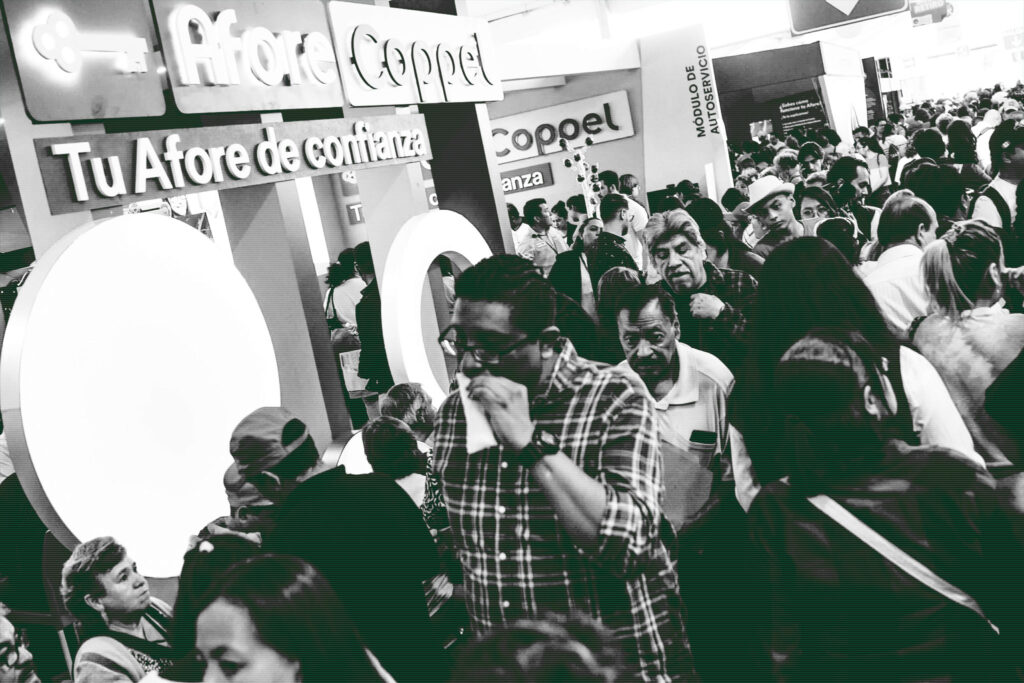The Project That Was Never “A Danger to Mexico”
This article by Hector Alejandro Quintanar appeared in the August 22, 2025 edition of Sin Embargo. Bernardo Bátiz V.
In the spring of 2006, on a Televisa program supposedly specialized in economics and apparently called Alebrijes, Eagle or Sun, three people appeared, very self-important, issuing speculations and predictions more akin to black magic than rigorous reflection. They were one José Yuste, a sort of Santiago Creel of the television [long-time right wing politician with the PAN party]; one Marco Mares, who hid his poor analyses in the Salinas-style rag La Crónica de hoy; and a person named Maricarmen Cortés, an economics columnist since 1980, according to her brief online biography.
It was she who issued the most devastating invective when, in a supposed analysis of the proposals of the Presidential candidates at the time, she accused López Obrador’s economic project of being unviable and that if it were implemented in Mexico it would be a disaster for the country. This assertion was supported by the other two alebrijes, or rather, the other two dull, cardboard cutouts, who nodded in concern at the apocalyptic prophecy of their colleague Cortés.
That tone was prevalent in the major electronic media in 2006, when the internet was not yet the central platform for public space and political conversation. The arsenal of diatribes against López Obrador’s economic proposal was extensive. Along with the rants of the television alebrijes, there were other forms of dirty propaganda. In those days of 2006, TV Azteca’s thug, Jaime Sánchez Susarrey, had published an entire book exposing absurdities about the Tabasco candidate’s economic project. It was titled, very unoriginally, An Irresponsible National Project: The Truth Behind López Obrador’s Government Program.
The book was a forgettable pamphlet in which the author, Sánchez Suarrey, spilled his obsessive prejudices. And this isn’t mentioned gratuitously. Concurrently with that text, another by the same author was circulating, titled, this time in a soporific and dull way, La victoria, a cheap piece of fiction, supposedly a political novel, in which Sánchez speculated about what would happen if López Obrador won the elections in that situation. The result was an irrelevant pamphlet in which the author only revealed himself to be a worse novelist than an analyst, which is saying something, and showed his lack of rigor, ignorance, or lack of information, because part of his novel consisted of speculating that López Obrador would name Manuel Camacho and then René Bejarano as Secretary of the Interior. A poor newspaper reader, Sánchez never realized that months earlier, López Obrador had published that if he won, he would name Juan Ramón de la Fuente, Marcelo Ebrard, and José María Pérez Gay to his cabinet; an issue that he fulfilled without hesitation in 2018, except for Pérez Gay, whom he could no longer invite because he had died in 2013.
All those redundant roundtables of supposed televised analysis; the tedious radio talk shows where histrionic hosts conferred with pedantic ideologues to discuss the iniquities of populism; endless essays in literary magazines explaining that López Obrador is an anti-democratic threat because he was born in the tropics; occasional literature predicting Armageddon if the Peje [nickname for AMLO, based on a fish from his native Tabasco] won—they were, in essence, slightly more sophisticated versions of the PAN’s fascist propaganda, that of López Obrador being “a danger to Mexico” because of his economic project.
Two decades later, it’s unclear whether all those obtuse voices should apologize or back down. The numbers are now a historic fact. Despite the backlighting, and despite a pandemic of unprecedented impact in a century, López Obrador’s project, the so-called Fourth Transformation, and Claudia Sheinbaum reduced poverty in Mexico to its historic low, with 13.4 million people lifted out of poverty.
And this is not due to the grace of heaven or chance, but rather to the fact that 70 percent of that figure is due to labor policy since 2018, lower income inflation. In other words, the poor ceased to be poor because the State made it clear that their labor efforts were commensurately rewarded. Added to this are a couple of facts: all of this has been done quickly—since in a single six-year term, the same number of people were lifted out of poverty as entered it from 2006 to 2018—and all of this has been done within the parameters of strict macroeconomic discipline, stability in that sense, and, furthermore, an appreciation of the Mexican peso not seen in several six-year terms.
In the end, López Obrador, the so-called Fourth Transformation, and Claudia Sheinbaum not only demolished the great neoliberal phantasms and their damaging myths, but also demonstrated that the supposed fanatics, tropical messiahs, worldless villagers, and obtuse obscurantists were actually those with the best merits, credentials, and technical expertise to govern.
The data released by INEGI in recent days is in itself good news. Historic, indeed: a reduction in poverty that changes the lives of many and allows for a better social foundation. And this good news in itself stands out by contrast, because it not only refutes its historical detractors but also completely exposes them, revealing that when they spoke of resentful fanatics or inept demagogues, they were actually talking about themselves and their environment.
And when it comes to political analysis, the best tool is history, evidence, precedents, and facts. They, and only they, are the source of an important political opinion. While no one is exempt from prejudices or biases, these must always be in honest dialogue with reality, otherwise they dominate us and what follows are gratuitous anathemas or irrational speculations, which, if not fulfilled, should undermine our credibility.
These days, the myths that have been in public debate for more than twenty years about the economic danger represented by López Obrador, his entourage, and Claudia Sheinbaum should finally and forever be put to rest. Little by little, like talkers competing with the lame, the other myths that complete the dark legend of Obradorism on the Mexican right will fall.
Perhaps when these myths finally dissolve, it will be a time for self-reflection and self-criticism, where they may realize that much of what they have uncritically supported was not a danger but a great harm to Mexico, and has resulted in harm to themselves because it has made them politically diminished, irrelevant, angry, and radicalized. Hopefully, they will realize this soon, although with the capacity they have shown, it doesn’t seem likely that such a thing will happen in this century.
Héctor Alejandro Quintanar is an academic at the Faculty of Political and Social Sciences of the UNAM, a doctoral student and professor at the Faculty of Philosophy of the University of Hradec Králové in the Czech Republic, author of the book The Roots of the National Regeneration Movement
-
People’s Mañanera January 19
President Sheinbaum’s daily press conference, with the ever-frequent reading of the polls, raising revenue without raising taxes, Salinas Pliego tax debt comes due, US Hercules plane landing in Mexico, and Mexican dying in ICE custody.
-
Our Water, In Whose Hands?
A promising vision from President Sheinbaum for public water management rapidly disappeared. Yet again the Mexican state openly assumes the role it has always played under neoliberalism: facilitating access to natural resources for special interests.
-
38 Billion Pesos Withdrawn from AFORE Accounts Due to Unemployment
The large number of Mexicans withdrawing from their pensions to survive unemployment indicates an urgent necessity to establish national unemployment insurance.




